Applying Watson's Theory: Personal Framework for Advanced Nursing
VerifiedAdded on 2023/01/23
|8
|2136
|58
Essay
AI Summary
This essay discusses the author's personal nursing philosophy and its alignment with Jean Watson's theory of caring. It highlights the importance of treating patients with dignity, showing compassion, and providing culturally competent, person-centered care. The essay elaborates on Watson's theory, emphasizing the value of kindness, love, and respect for the spiritual dimensions of patients. It identifies areas where the author's principles match Watson's theory, such as fostering therapeutic relationships and empowering patients. A situation where Watson's theory can be applied, such as in residential care for an elderly woman, is presented, along with scenarios where the theory may not be suitable, particularly in acute care settings requiring immediate biophysical interventions. The essay concludes that Watson’s theory is valuable for meeting psychosocial needs but may be insufficient for addressing biophysical needs in certain contexts.
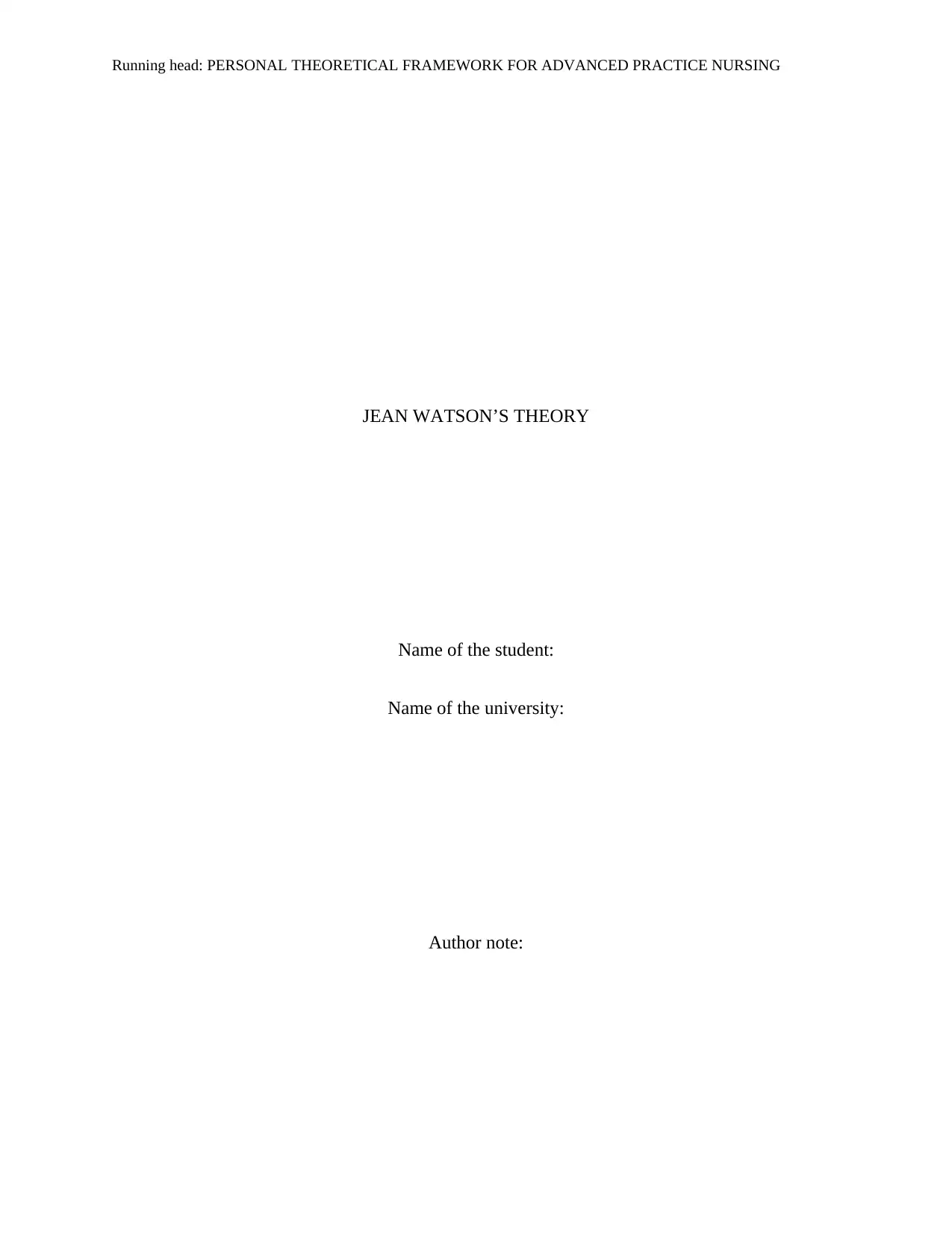
Running head: PERSONAL THEORETICAL FRAMEWORK FOR ADVANCED PRACTICE NURSING
JEAN WATSON’S THEORY
Name of the student:
Name of the university:
Author note:
JEAN WATSON’S THEORY
Name of the student:
Name of the university:
Author note:
Paraphrase This Document
Need a fresh take? Get an instant paraphrase of this document with our AI Paraphraser
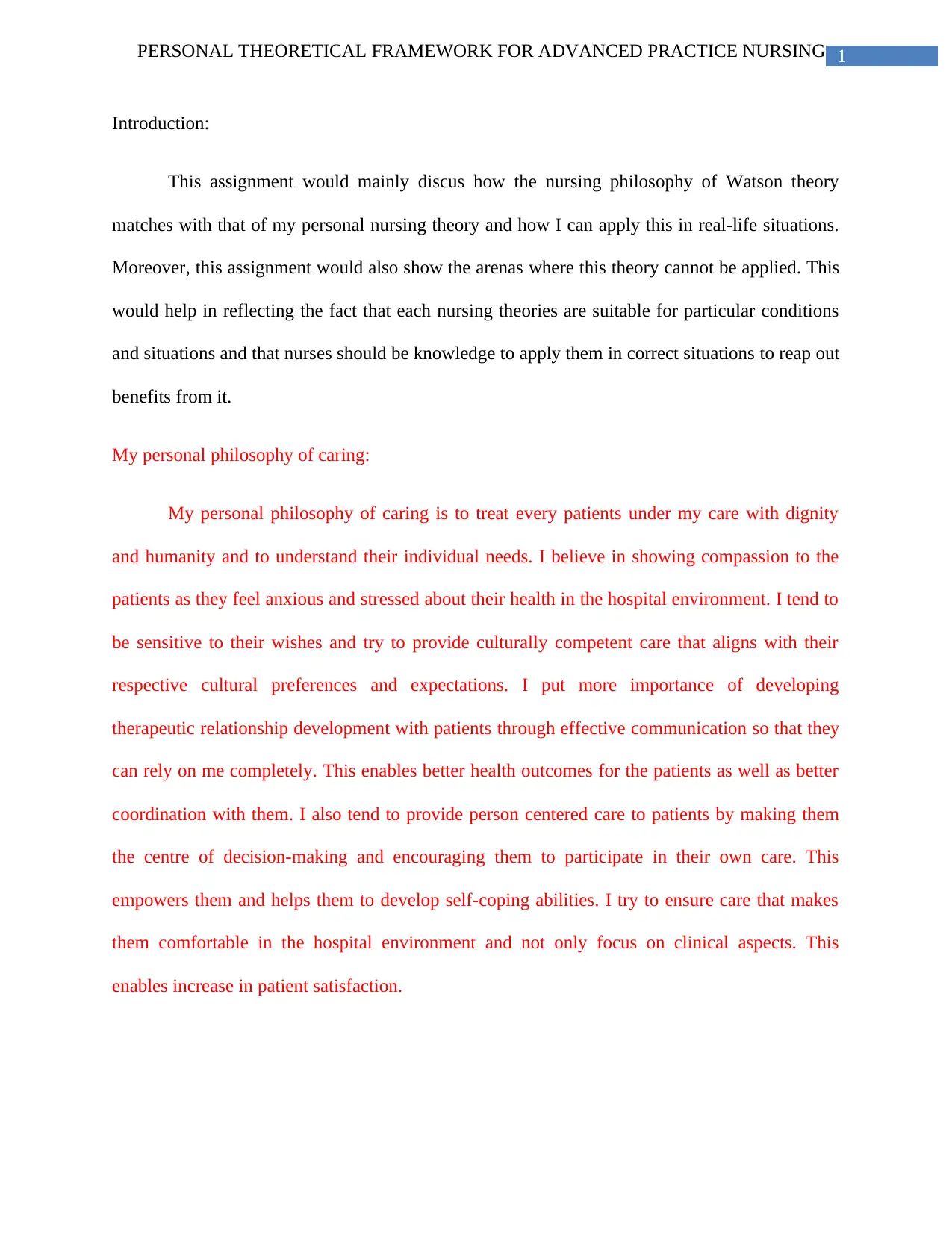
1PERSONAL THEORETICAL FRAMEWORK FOR ADVANCED PRACTICE NURSING
Introduction:
This assignment would mainly discus how the nursing philosophy of Watson theory
matches with that of my personal nursing theory and how I can apply this in real-life situations.
Moreover, this assignment would also show the arenas where this theory cannot be applied. This
would help in reflecting the fact that each nursing theories are suitable for particular conditions
and situations and that nurses should be knowledge to apply them in correct situations to reap out
benefits from it.
My personal philosophy of caring:
My personal philosophy of caring is to treat every patients under my care with dignity
and humanity and to understand their individual needs. I believe in showing compassion to the
patients as they feel anxious and stressed about their health in the hospital environment. I tend to
be sensitive to their wishes and try to provide culturally competent care that aligns with their
respective cultural preferences and expectations. I put more importance of developing
therapeutic relationship development with patients through effective communication so that they
can rely on me completely. This enables better health outcomes for the patients as well as better
coordination with them. I also tend to provide person centered care to patients by making them
the centre of decision-making and encouraging them to participate in their own care. This
empowers them and helps them to develop self-coping abilities. I try to ensure care that makes
them comfortable in the hospital environment and not only focus on clinical aspects. This
enables increase in patient satisfaction.
Introduction:
This assignment would mainly discus how the nursing philosophy of Watson theory
matches with that of my personal nursing theory and how I can apply this in real-life situations.
Moreover, this assignment would also show the arenas where this theory cannot be applied. This
would help in reflecting the fact that each nursing theories are suitable for particular conditions
and situations and that nurses should be knowledge to apply them in correct situations to reap out
benefits from it.
My personal philosophy of caring:
My personal philosophy of caring is to treat every patients under my care with dignity
and humanity and to understand their individual needs. I believe in showing compassion to the
patients as they feel anxious and stressed about their health in the hospital environment. I tend to
be sensitive to their wishes and try to provide culturally competent care that aligns with their
respective cultural preferences and expectations. I put more importance of developing
therapeutic relationship development with patients through effective communication so that they
can rely on me completely. This enables better health outcomes for the patients as well as better
coordination with them. I also tend to provide person centered care to patients by making them
the centre of decision-making and encouraging them to participate in their own care. This
empowers them and helps them to develop self-coping abilities. I try to ensure care that makes
them comfortable in the hospital environment and not only focus on clinical aspects. This
enables increase in patient satisfaction.
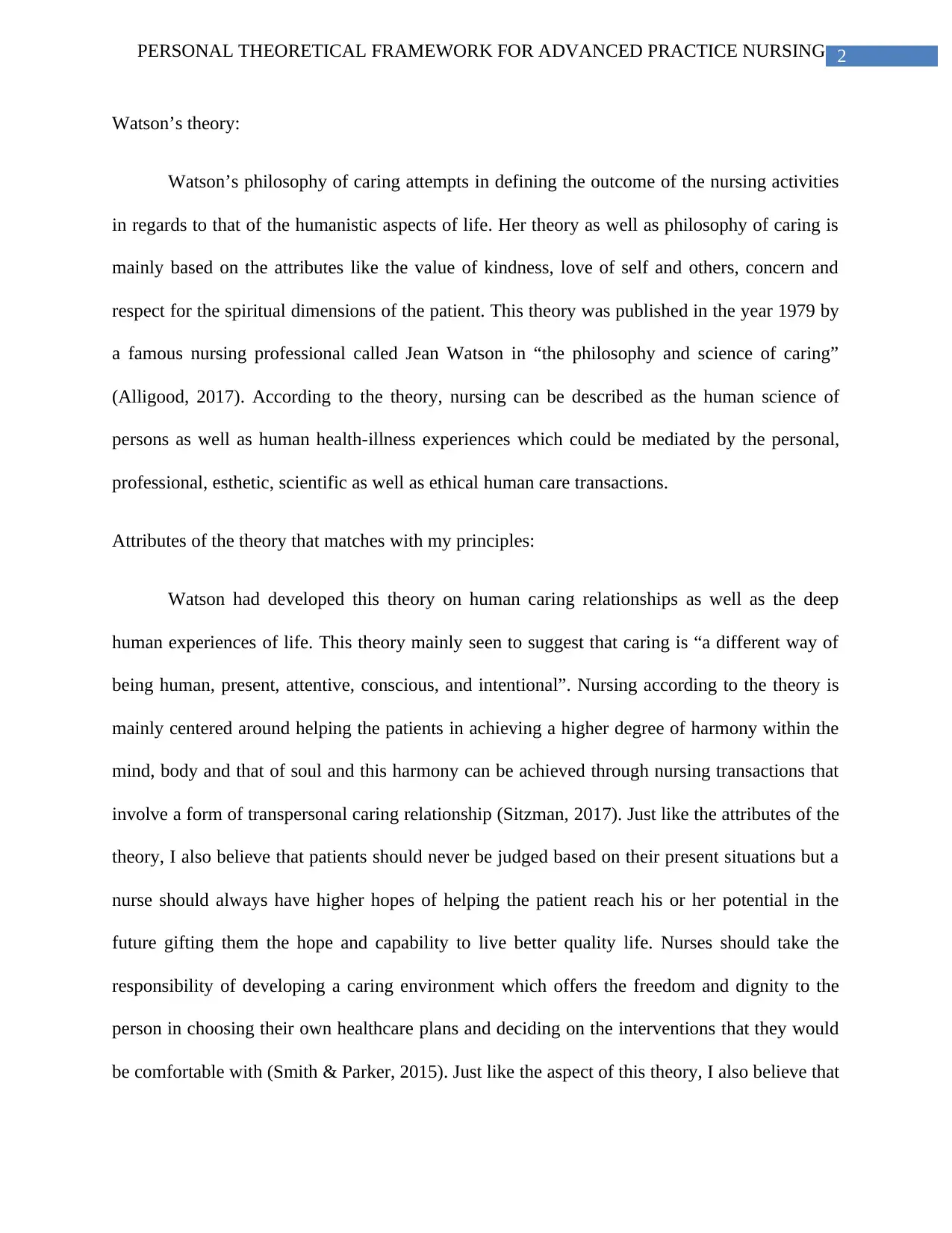
2PERSONAL THEORETICAL FRAMEWORK FOR ADVANCED PRACTICE NURSING
Watson’s theory:
Watson’s philosophy of caring attempts in defining the outcome of the nursing activities
in regards to that of the humanistic aspects of life. Her theory as well as philosophy of caring is
mainly based on the attributes like the value of kindness, love of self and others, concern and
respect for the spiritual dimensions of the patient. This theory was published in the year 1979 by
a famous nursing professional called Jean Watson in “the philosophy and science of caring”
(Alligood, 2017). According to the theory, nursing can be described as the human science of
persons as well as human health-illness experiences which could be mediated by the personal,
professional, esthetic, scientific as well as ethical human care transactions.
Attributes of the theory that matches with my principles:
Watson had developed this theory on human caring relationships as well as the deep
human experiences of life. This theory mainly seen to suggest that caring is “a different way of
being human, present, attentive, conscious, and intentional”. Nursing according to the theory is
mainly centered around helping the patients in achieving a higher degree of harmony within the
mind, body and that of soul and this harmony can be achieved through nursing transactions that
involve a form of transpersonal caring relationship (Sitzman, 2017). Just like the attributes of the
theory, I also believe that patients should never be judged based on their present situations but a
nurse should always have higher hopes of helping the patient reach his or her potential in the
future gifting them the hope and capability to live better quality life. Nurses should take the
responsibility of developing a caring environment which offers the freedom and dignity to the
person in choosing their own healthcare plans and deciding on the interventions that they would
be comfortable with (Smith & Parker, 2015). Just like the aspect of this theory, I also believe that
Watson’s theory:
Watson’s philosophy of caring attempts in defining the outcome of the nursing activities
in regards to that of the humanistic aspects of life. Her theory as well as philosophy of caring is
mainly based on the attributes like the value of kindness, love of self and others, concern and
respect for the spiritual dimensions of the patient. This theory was published in the year 1979 by
a famous nursing professional called Jean Watson in “the philosophy and science of caring”
(Alligood, 2017). According to the theory, nursing can be described as the human science of
persons as well as human health-illness experiences which could be mediated by the personal,
professional, esthetic, scientific as well as ethical human care transactions.
Attributes of the theory that matches with my principles:
Watson had developed this theory on human caring relationships as well as the deep
human experiences of life. This theory mainly seen to suggest that caring is “a different way of
being human, present, attentive, conscious, and intentional”. Nursing according to the theory is
mainly centered around helping the patients in achieving a higher degree of harmony within the
mind, body and that of soul and this harmony can be achieved through nursing transactions that
involve a form of transpersonal caring relationship (Sitzman, 2017). Just like the attributes of the
theory, I also believe that patients should never be judged based on their present situations but a
nurse should always have higher hopes of helping the patient reach his or her potential in the
future gifting them the hope and capability to live better quality life. Nurses should take the
responsibility of developing a caring environment which offers the freedom and dignity to the
person in choosing their own healthcare plans and deciding on the interventions that they would
be comfortable with (Smith & Parker, 2015). Just like the aspect of this theory, I also believe that
⊘ This is a preview!⊘
Do you want full access?
Subscribe today to unlock all pages.

Trusted by 1+ million students worldwide
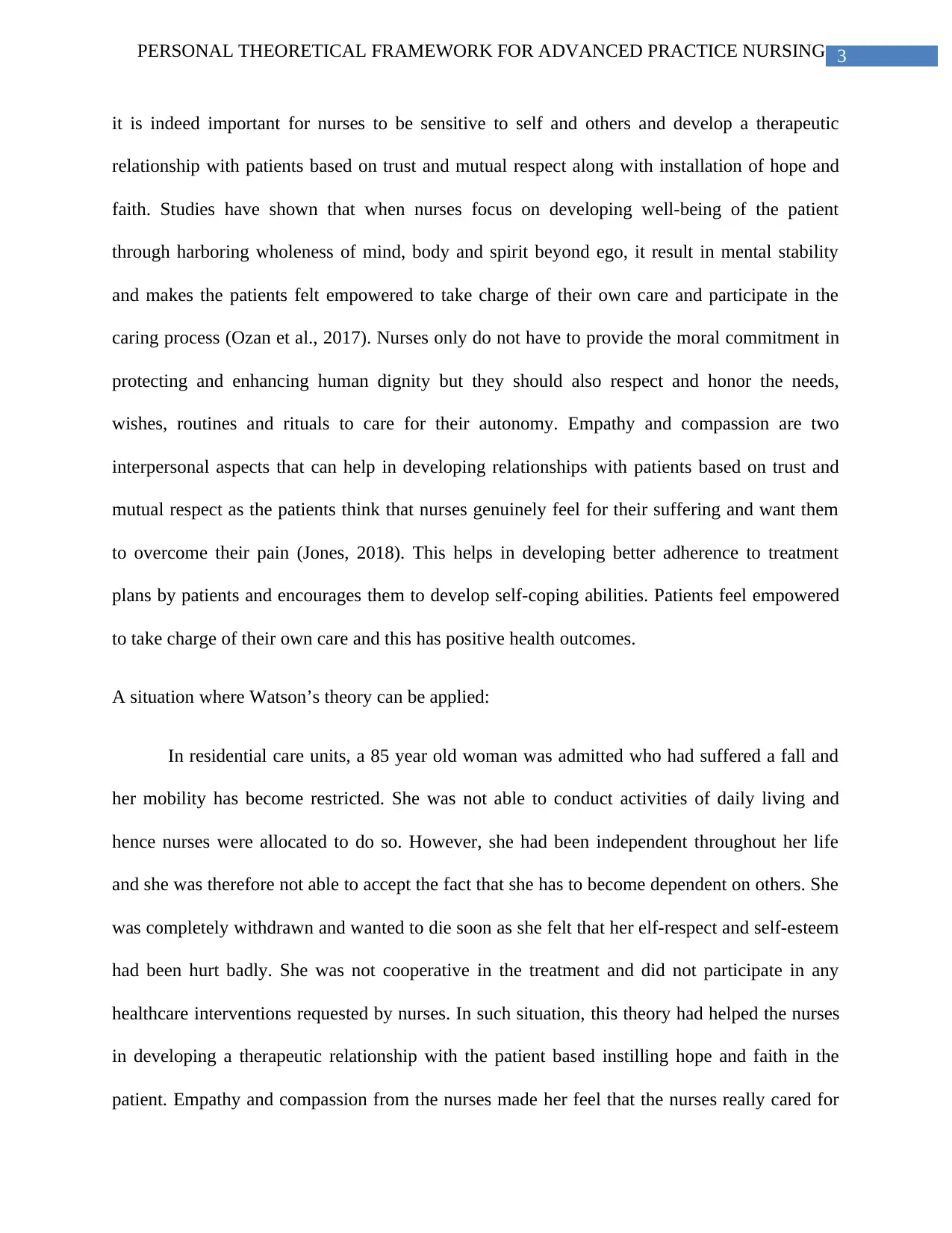
3PERSONAL THEORETICAL FRAMEWORK FOR ADVANCED PRACTICE NURSING
it is indeed important for nurses to be sensitive to self and others and develop a therapeutic
relationship with patients based on trust and mutual respect along with installation of hope and
faith. Studies have shown that when nurses focus on developing well-being of the patient
through harboring wholeness of mind, body and spirit beyond ego, it result in mental stability
and makes the patients felt empowered to take charge of their own care and participate in the
caring process (Ozan et al., 2017). Nurses only do not have to provide the moral commitment in
protecting and enhancing human dignity but they should also respect and honor the needs,
wishes, routines and rituals to care for their autonomy. Empathy and compassion are two
interpersonal aspects that can help in developing relationships with patients based on trust and
mutual respect as the patients think that nurses genuinely feel for their suffering and want them
to overcome their pain (Jones, 2018). This helps in developing better adherence to treatment
plans by patients and encourages them to develop self-coping abilities. Patients feel empowered
to take charge of their own care and this has positive health outcomes.
A situation where Watson’s theory can be applied:
In residential care units, a 85 year old woman was admitted who had suffered a fall and
her mobility has become restricted. She was not able to conduct activities of daily living and
hence nurses were allocated to do so. However, she had been independent throughout her life
and she was therefore not able to accept the fact that she has to become dependent on others. She
was completely withdrawn and wanted to die soon as she felt that her elf-respect and self-esteem
had been hurt badly. She was not cooperative in the treatment and did not participate in any
healthcare interventions requested by nurses. In such situation, this theory had helped the nurses
in developing a therapeutic relationship with the patient based instilling hope and faith in the
patient. Empathy and compassion from the nurses made her feel that the nurses really cared for
it is indeed important for nurses to be sensitive to self and others and develop a therapeutic
relationship with patients based on trust and mutual respect along with installation of hope and
faith. Studies have shown that when nurses focus on developing well-being of the patient
through harboring wholeness of mind, body and spirit beyond ego, it result in mental stability
and makes the patients felt empowered to take charge of their own care and participate in the
caring process (Ozan et al., 2017). Nurses only do not have to provide the moral commitment in
protecting and enhancing human dignity but they should also respect and honor the needs,
wishes, routines and rituals to care for their autonomy. Empathy and compassion are two
interpersonal aspects that can help in developing relationships with patients based on trust and
mutual respect as the patients think that nurses genuinely feel for their suffering and want them
to overcome their pain (Jones, 2018). This helps in developing better adherence to treatment
plans by patients and encourages them to develop self-coping abilities. Patients feel empowered
to take charge of their own care and this has positive health outcomes.
A situation where Watson’s theory can be applied:
In residential care units, a 85 year old woman was admitted who had suffered a fall and
her mobility has become restricted. She was not able to conduct activities of daily living and
hence nurses were allocated to do so. However, she had been independent throughout her life
and she was therefore not able to accept the fact that she has to become dependent on others. She
was completely withdrawn and wanted to die soon as she felt that her elf-respect and self-esteem
had been hurt badly. She was not cooperative in the treatment and did not participate in any
healthcare interventions requested by nurses. In such situation, this theory had helped the nurses
in developing a therapeutic relationship with the patient based instilling hope and faith in the
patient. Empathy and compassion from the nurses made her feel that the nurses really cared for
Paraphrase This Document
Need a fresh take? Get an instant paraphrase of this document with our AI Paraphraser
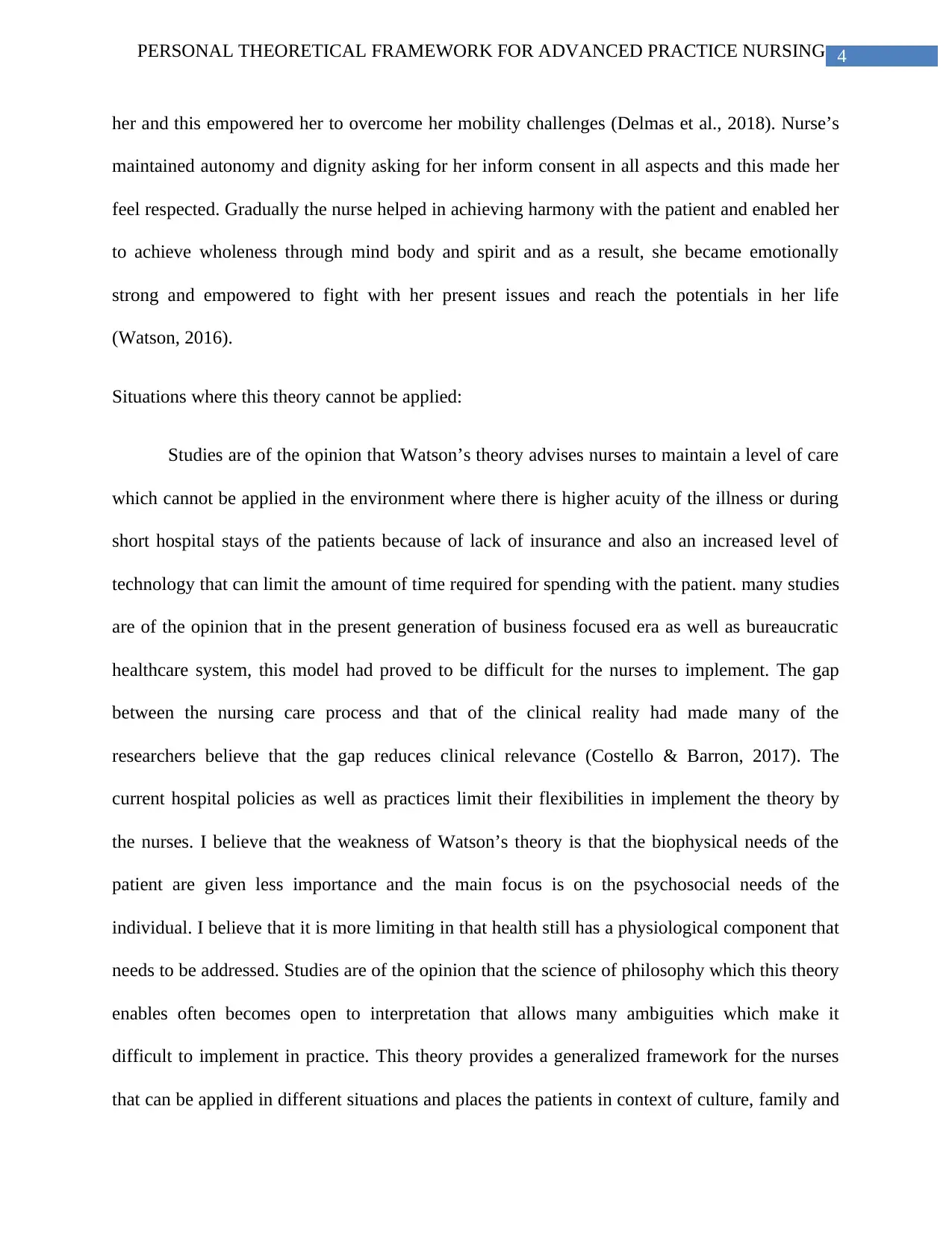
4PERSONAL THEORETICAL FRAMEWORK FOR ADVANCED PRACTICE NURSING
her and this empowered her to overcome her mobility challenges (Delmas et al., 2018). Nurse’s
maintained autonomy and dignity asking for her inform consent in all aspects and this made her
feel respected. Gradually the nurse helped in achieving harmony with the patient and enabled her
to achieve wholeness through mind body and spirit and as a result, she became emotionally
strong and empowered to fight with her present issues and reach the potentials in her life
(Watson, 2016).
Situations where this theory cannot be applied:
Studies are of the opinion that Watson’s theory advises nurses to maintain a level of care
which cannot be applied in the environment where there is higher acuity of the illness or during
short hospital stays of the patients because of lack of insurance and also an increased level of
technology that can limit the amount of time required for spending with the patient. many studies
are of the opinion that in the present generation of business focused era as well as bureaucratic
healthcare system, this model had proved to be difficult for the nurses to implement. The gap
between the nursing care process and that of the clinical reality had made many of the
researchers believe that the gap reduces clinical relevance (Costello & Barron, 2017). The
current hospital policies as well as practices limit their flexibilities in implement the theory by
the nurses. I believe that the weakness of Watson’s theory is that the biophysical needs of the
patient are given less importance and the main focus is on the psychosocial needs of the
individual. I believe that it is more limiting in that health still has a physiological component that
needs to be addressed. Studies are of the opinion that the science of philosophy which this theory
enables often becomes open to interpretation that allows many ambiguities which make it
difficult to implement in practice. This theory provides a generalized framework for the nurses
that can be applied in different situations and places the patients in context of culture, family and
her and this empowered her to overcome her mobility challenges (Delmas et al., 2018). Nurse’s
maintained autonomy and dignity asking for her inform consent in all aspects and this made her
feel respected. Gradually the nurse helped in achieving harmony with the patient and enabled her
to achieve wholeness through mind body and spirit and as a result, she became emotionally
strong and empowered to fight with her present issues and reach the potentials in her life
(Watson, 2016).
Situations where this theory cannot be applied:
Studies are of the opinion that Watson’s theory advises nurses to maintain a level of care
which cannot be applied in the environment where there is higher acuity of the illness or during
short hospital stays of the patients because of lack of insurance and also an increased level of
technology that can limit the amount of time required for spending with the patient. many studies
are of the opinion that in the present generation of business focused era as well as bureaucratic
healthcare system, this model had proved to be difficult for the nurses to implement. The gap
between the nursing care process and that of the clinical reality had made many of the
researchers believe that the gap reduces clinical relevance (Costello & Barron, 2017). The
current hospital policies as well as practices limit their flexibilities in implement the theory by
the nurses. I believe that the weakness of Watson’s theory is that the biophysical needs of the
patient are given less importance and the main focus is on the psychosocial needs of the
individual. I believe that it is more limiting in that health still has a physiological component that
needs to be addressed. Studies are of the opinion that the science of philosophy which this theory
enables often becomes open to interpretation that allows many ambiguities which make it
difficult to implement in practice. This theory provides a generalized framework for the nurses
that can be applied in different situations and places the patients in context of culture, family and
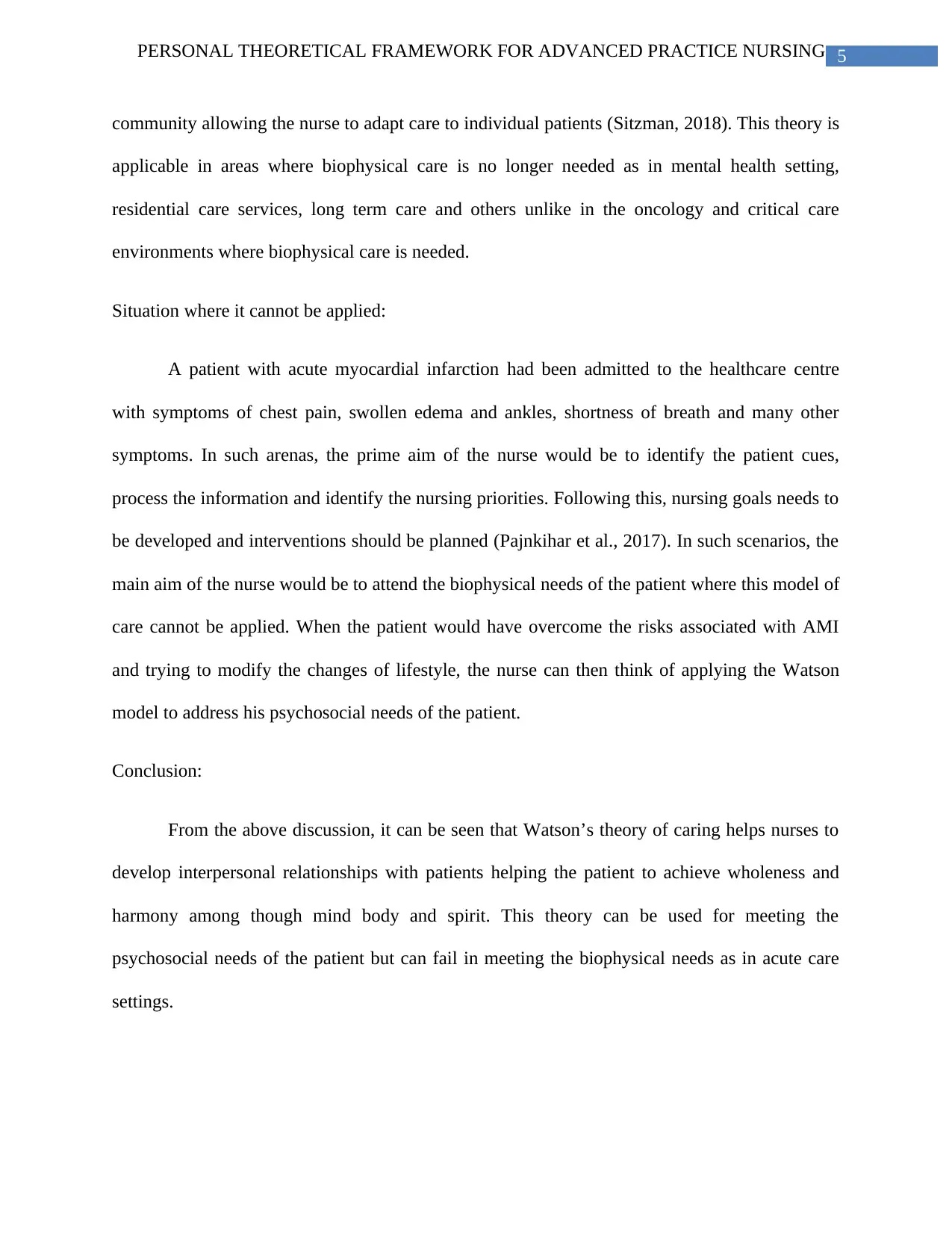
5PERSONAL THEORETICAL FRAMEWORK FOR ADVANCED PRACTICE NURSING
community allowing the nurse to adapt care to individual patients (Sitzman, 2018). This theory is
applicable in areas where biophysical care is no longer needed as in mental health setting,
residential care services, long term care and others unlike in the oncology and critical care
environments where biophysical care is needed.
Situation where it cannot be applied:
A patient with acute myocardial infarction had been admitted to the healthcare centre
with symptoms of chest pain, swollen edema and ankles, shortness of breath and many other
symptoms. In such arenas, the prime aim of the nurse would be to identify the patient cues,
process the information and identify the nursing priorities. Following this, nursing goals needs to
be developed and interventions should be planned (Pajnkihar et al., 2017). In such scenarios, the
main aim of the nurse would be to attend the biophysical needs of the patient where this model of
care cannot be applied. When the patient would have overcome the risks associated with AMI
and trying to modify the changes of lifestyle, the nurse can then think of applying the Watson
model to address his psychosocial needs of the patient.
Conclusion:
From the above discussion, it can be seen that Watson’s theory of caring helps nurses to
develop interpersonal relationships with patients helping the patient to achieve wholeness and
harmony among though mind body and spirit. This theory can be used for meeting the
psychosocial needs of the patient but can fail in meeting the biophysical needs as in acute care
settings.
community allowing the nurse to adapt care to individual patients (Sitzman, 2018). This theory is
applicable in areas where biophysical care is no longer needed as in mental health setting,
residential care services, long term care and others unlike in the oncology and critical care
environments where biophysical care is needed.
Situation where it cannot be applied:
A patient with acute myocardial infarction had been admitted to the healthcare centre
with symptoms of chest pain, swollen edema and ankles, shortness of breath and many other
symptoms. In such arenas, the prime aim of the nurse would be to identify the patient cues,
process the information and identify the nursing priorities. Following this, nursing goals needs to
be developed and interventions should be planned (Pajnkihar et al., 2017). In such scenarios, the
main aim of the nurse would be to attend the biophysical needs of the patient where this model of
care cannot be applied. When the patient would have overcome the risks associated with AMI
and trying to modify the changes of lifestyle, the nurse can then think of applying the Watson
model to address his psychosocial needs of the patient.
Conclusion:
From the above discussion, it can be seen that Watson’s theory of caring helps nurses to
develop interpersonal relationships with patients helping the patient to achieve wholeness and
harmony among though mind body and spirit. This theory can be used for meeting the
psychosocial needs of the patient but can fail in meeting the biophysical needs as in acute care
settings.
⊘ This is a preview!⊘
Do you want full access?
Subscribe today to unlock all pages.

Trusted by 1+ million students worldwide
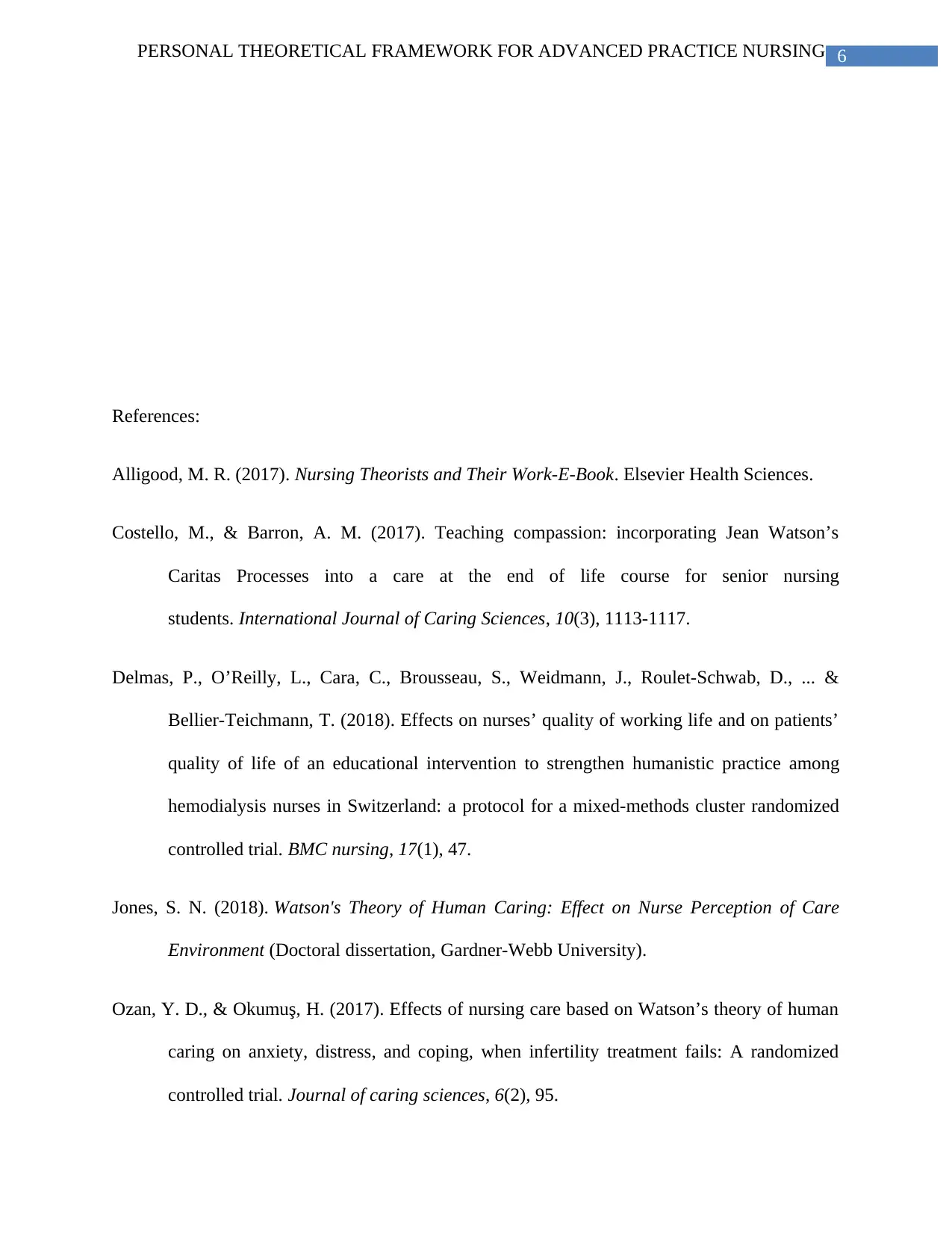
6PERSONAL THEORETICAL FRAMEWORK FOR ADVANCED PRACTICE NURSING
References:
Alligood, M. R. (2017). Nursing Theorists and Their Work-E-Book. Elsevier Health Sciences.
Costello, M., & Barron, A. M. (2017). Teaching compassion: incorporating Jean Watson’s
Caritas Processes into a care at the end of life course for senior nursing
students. International Journal of Caring Sciences, 10(3), 1113-1117.
Delmas, P., O’Reilly, L., Cara, C., Brousseau, S., Weidmann, J., Roulet-Schwab, D., ... &
Bellier-Teichmann, T. (2018). Effects on nurses’ quality of working life and on patients’
quality of life of an educational intervention to strengthen humanistic practice among
hemodialysis nurses in Switzerland: a protocol for a mixed-methods cluster randomized
controlled trial. BMC nursing, 17(1), 47.
Jones, S. N. (2018). Watson's Theory of Human Caring: Effect on Nurse Perception of Care
Environment (Doctoral dissertation, Gardner-Webb University).
Ozan, Y. D., & Okumuş, H. (2017). Effects of nursing care based on Watson’s theory of human
caring on anxiety, distress, and coping, when infertility treatment fails: A randomized
controlled trial. Journal of caring sciences, 6(2), 95.
References:
Alligood, M. R. (2017). Nursing Theorists and Their Work-E-Book. Elsevier Health Sciences.
Costello, M., & Barron, A. M. (2017). Teaching compassion: incorporating Jean Watson’s
Caritas Processes into a care at the end of life course for senior nursing
students. International Journal of Caring Sciences, 10(3), 1113-1117.
Delmas, P., O’Reilly, L., Cara, C., Brousseau, S., Weidmann, J., Roulet-Schwab, D., ... &
Bellier-Teichmann, T. (2018). Effects on nurses’ quality of working life and on patients’
quality of life of an educational intervention to strengthen humanistic practice among
hemodialysis nurses in Switzerland: a protocol for a mixed-methods cluster randomized
controlled trial. BMC nursing, 17(1), 47.
Jones, S. N. (2018). Watson's Theory of Human Caring: Effect on Nurse Perception of Care
Environment (Doctoral dissertation, Gardner-Webb University).
Ozan, Y. D., & Okumuş, H. (2017). Effects of nursing care based on Watson’s theory of human
caring on anxiety, distress, and coping, when infertility treatment fails: A randomized
controlled trial. Journal of caring sciences, 6(2), 95.
Paraphrase This Document
Need a fresh take? Get an instant paraphrase of this document with our AI Paraphraser
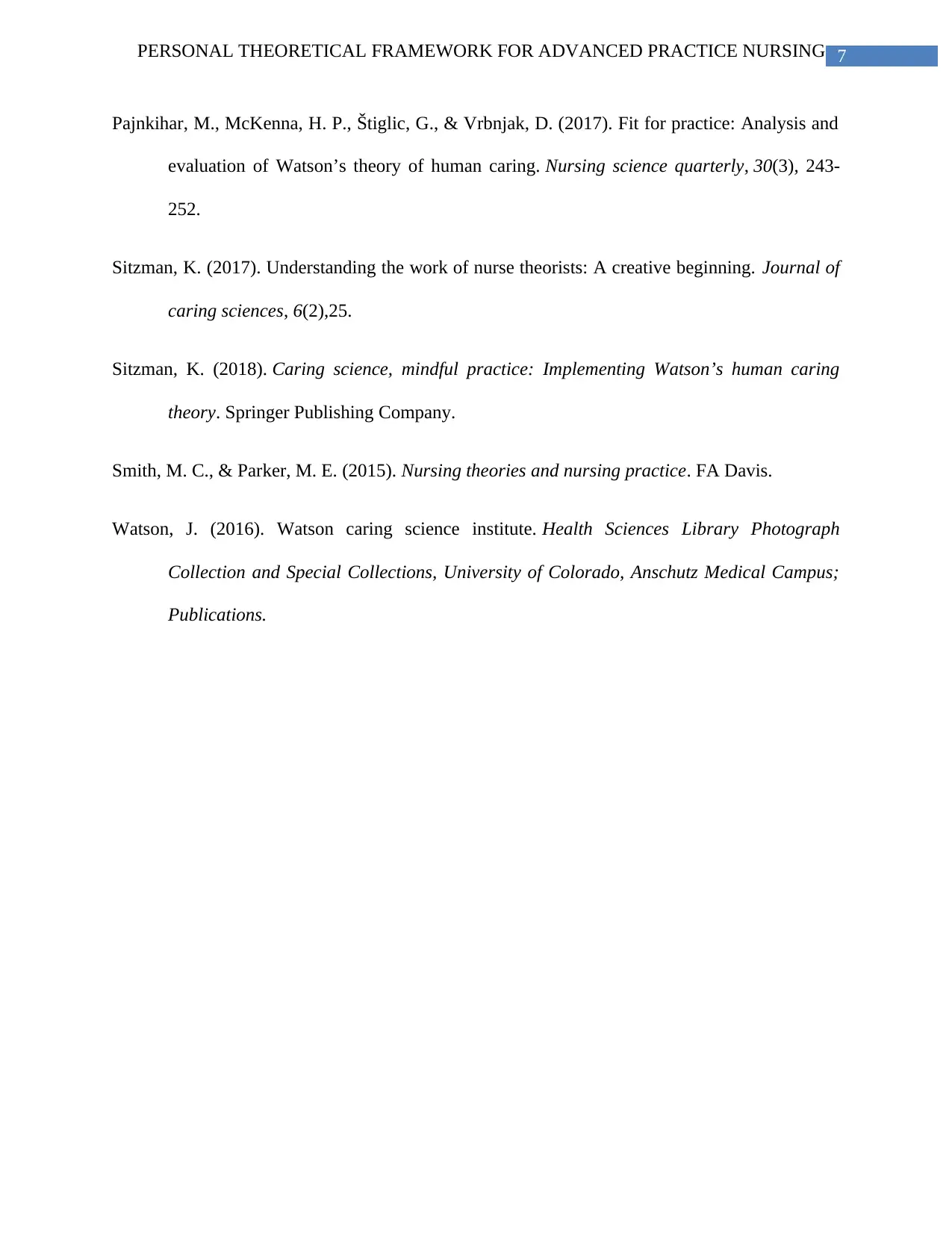
7PERSONAL THEORETICAL FRAMEWORK FOR ADVANCED PRACTICE NURSING
Pajnkihar, M., McKenna, H. P., Štiglic, G., & Vrbnjak, D. (2017). Fit for practice: Analysis and
evaluation of Watson’s theory of human caring. Nursing science quarterly, 30(3), 243-
252.
Sitzman, K. (2017). Understanding the work of nurse theorists: A creative beginning. Journal of
caring sciences, 6(2),25.
Sitzman, K. (2018). Caring science, mindful practice: Implementing Watson’s human caring
theory. Springer Publishing Company.
Smith, M. C., & Parker, M. E. (2015). Nursing theories and nursing practice. FA Davis.
Watson, J. (2016). Watson caring science institute. Health Sciences Library Photograph
Collection and Special Collections, University of Colorado, Anschutz Medical Campus;
Publications.
Pajnkihar, M., McKenna, H. P., Štiglic, G., & Vrbnjak, D. (2017). Fit for practice: Analysis and
evaluation of Watson’s theory of human caring. Nursing science quarterly, 30(3), 243-
252.
Sitzman, K. (2017). Understanding the work of nurse theorists: A creative beginning. Journal of
caring sciences, 6(2),25.
Sitzman, K. (2018). Caring science, mindful practice: Implementing Watson’s human caring
theory. Springer Publishing Company.
Smith, M. C., & Parker, M. E. (2015). Nursing theories and nursing practice. FA Davis.
Watson, J. (2016). Watson caring science institute. Health Sciences Library Photograph
Collection and Special Collections, University of Colorado, Anschutz Medical Campus;
Publications.
1 out of 8
Related Documents
Your All-in-One AI-Powered Toolkit for Academic Success.
+13062052269
info@desklib.com
Available 24*7 on WhatsApp / Email
![[object Object]](/_next/static/media/star-bottom.7253800d.svg)
Unlock your academic potential
Copyright © 2020–2025 A2Z Services. All Rights Reserved. Developed and managed by ZUCOL.





